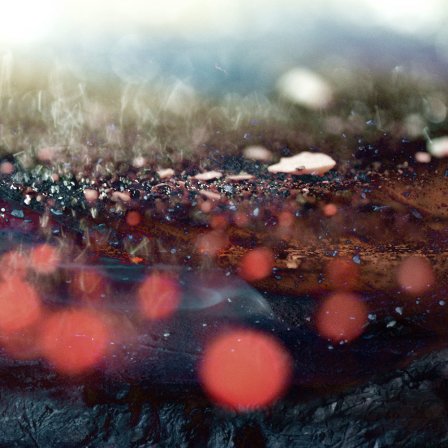Four years ago, Japan was hit by one of the most violent natural disasters in recent memory. The Tōhoku earthquake and tsunami saw over 15,000 people lose their lives; 3,000 people were displaced; and the nuclear power plant at Fukushima went into meltdown. It was a truly devastating event and another in a series of disasters that verifies our vulnerability as a species, regardless of technical aspiration and supposed environmental awareness. And yet, the documentation of such horrific moments in human history is extraordinarily well developed, and it was in a series of photographs of Tōhoku that Leafcutter John (a.k.a. John Burton) found the inspiration for his first album in nine years, Resurrection.
The online footage and photography of the natural disaster is horrendous enough to endure. It comes in a number of different formats that have varying degrees of effect, from sweeping aerial shots of the destruction as whole cities were submerged to on-the-ground witnesses shooting with their cell phones as their lives, neighbors, and history were transported by a 40-meter-high tidal wave. The high-definition macro imagery that gave international audiences perspective on the size of the tragedy are able to offer some insight, but it’s impossible to imagine the geological force that shook this catastrophe into being, as well as the humanitarian repercussions it had on the country. The act of using these images as a source of inspiration is a bold move in itself, but Burton handles the event with a gracious charm. He alludes to the helplessness, the crushing strength, and the chaos by emphasizing his reactions to the photos, rather than directly assessing the subject matter.
This is achieved by tracing the artist’s route back through environmental soundscape compositions of past releases and redrafting them here with wondrous intent. As a moniker half-removed from Polar Bear — his London-based jazz quintet — Leafcutter John came to prominence in 2000 when he caught the attention of Mike Paradinas and consequently released two full-length albums on Planet Mu. Burton always seemed to be an anomaly on the Planet Mu roster when taking into account his apparent preferences for jazz, field recordings, and chance music — all of which played varying roles throughout his catalog. But on Resurrection, these interests and styles are distilled entirely through reacting to images of a singular event that shaped the history of an entire nation.
Judging by track titles “Endless Wave,” “Music Under the Water,” and even “Gulp,” the clash between aerial documentation and on-the-ground desolation appear to also have swayed Burton’s compositional approach. “I Know You Can” opens with a crackled scrap of static, glitch, and skewed vocal cuts, while “Gulps” closes the album with a swarm of aquatic tones and minimal melody. It gives you the feeling of being completely submerged by Burton’s thought process and reflection on the incident. He uses a combination of frantic improvisation and long-form composition to bring these opposing perspectives of documentation together. The resulting music is incredible to hear, making Resurrection one of Burton’s most essential releases to date.
Perhaps the most stunning of these pieces is “Endless Wave,” which opens as a coastal field recording. In the context of this album, it sounds almost eerie as a peaceful glimpse into private moments at the seaside. But the track then unfolds into a flux of sporadic synth keys before a deep and resonant tone hits (a sample from Strings of Consciousness’ “Forest Of Spades”), accompanying Burton as he pines the album’s only discernible lyric “when the bough breaks, when the bough breaks.” It’s a wonderfully moving piece of music that calls to mind the tenderness and care of Jacob’s Stories with the long-form ritardando of Jóhann Jóhannsson’s Fordlandia. But the handling of the subject also remains vital here, where there is a feeling of sorrow, despair, and desperation that clings together within the swirl of artistic response. As detached as Burton may have been from the tsunami when it took place, his connection with the photographs here has surely left a mark on him, while Resurrection is likely to have a similar impact on those who take their time to embrace it.
More about: Leafcutter John


